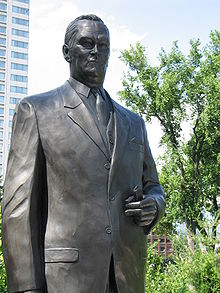Jean Lesage
Jean Lesage , PC , CC (born June 10, 1912 in Québec , † December 12, 1980 ibid) was a Canadian politician. He was Prime Minister of the Province of Québec from 1960 to 1966 .
Life
Career as a lawyer
Jean Lesage was the son of Cécile Côté and Xavéri Lesage, a teacher and civil servant in Montreal . Jean Lesage attended the Saint-Louis-de-Gonzague School in Québec, the Séminaire de Québec and the Université Laval , where he graduated with a law degree. On July 10, 1934, he was inducted into the Québec Province Bar.
He practiced his profession as a lawyer together with Paul Lesage (1934), later with Charles Gavan Power, Valmore Bienvenue, Paul Lesage and Jean Turgeon. Lesage married the opera singer Corinne Lagarde. From 1939 to 1944 he was a public prosecutor.
Career as a politician
In the course of the elections of 1945 Lesage was elected as a member of the Liberal Party of Canada for the district of Montmagny-L'Islet . In 1949 he was re-elected. From January 24, 1951 to December 31, 1952, he was parliamentary deputy to the State Secretary for Foreign Affairs, then until June 13, 1953, parliamentary deputy to the finance minister. With his re-election on September 17, Lesage became Minister for Resources and Economic Development in the Saint-Laurent cabinet. Lesage served as Minister for Northern Canada and Natural Resources from December 16, 1953 to June 21, 1957. With his re-election in 1957 and 1958, Lesage survived the progressist-conservative Diefenbaker government, but gave up his seat in parliament when he was elected party leader on May 31, 1958.
The Lesage government
Jean Lesage won the 1960 elections and was Prime Minister, President of the Executive Council and Finance Minister from July 5, 1960 to June 16, 1966, and Minister for Federal-Provincial Affairs from March 28, 1961. From May 30th to August 8th 1963 he was Minister for State Revenue.
The nationalization plebiscite
Lesage's government program went beyond simple economic reforms. Traditionally conservative Québec enjoyed relative political and economic autonomy. Lesage wanted to change the provincial institutions and mindsets; the nationalization of their influential hydropower operators should be a "detonator" .
Lesage called on September 19, 1962 general elections for the nationalization of the electricity companies. On the evening of November 11th, a dispute - the first in Canadian history - between Lesage and opposition chief Daniel Johnson was televised.
The silent revolution of the "Belle Province"
The Lesage government benefited from the rapid economic growth and completely restructured the province of Québec with the help of several large projects. Natural resources have been nationalized; In 1964 and 1965 the state companies Sidérurgie du Québec and Société québécoise d'exploration minière were founded. Lesage, concerned about the independence and competence of the state, undertook a profound educational reform that culminated in the establishment of the Ministry of Education in 1964. In 1961, the Parent Commission was set up to develop recommendations that led to the implementation of various reforms. The most important was the complete secularization of education. Schools retained their Catholic or Reformed character pro forma , but in practice they became secular institutions. Other reforms were the introduction of compulsory schooling up to the age of 16 and free instruction up to the eleventh year of school. The church health service was also placed under the control of the provincial government. In addition, its own health insurance company was founded in Québec in 1961. Lesage founded the Ministry of Culture and the Ministry of State Income and Federal-Provincial Affairs. In addition, foreign missions were set up for Québec (1961 in Paris and 1963 in London). These radical reforms are known as the tranquille revolution .
In the 1966 elections, however, the rural district representatives, who were less inclined towards the Liberals, gained a large majority over the city districts - although the Liberal Party received the most votes. Thus the Union National became the strongest force. After the end of his executive mandate, Lesage became a member of the Louis-Hébert government in 1966 and was head of the opposition until 1970. On August 28, 1969, Lesage had already announced his resignation from the office of party leader.
The last few years
After April 1970, Lesage became a member of a commission charged by the Québec government to draft legislation. From 1965 to 1970 Lesage was Colonel of Honor in the 6th Artillery Regiment; since then he has been a director of several companies such as Lever Brothers Ltd., Montreal Trust Co., Mondev Corporation Ltd., Campbell Chibougamau Mines Ltd. and JJ Baker Ltd. In 1971 he was a member of the Board of Directors of Canadian Reynolds Metals Co. In June 1972, he was named Chairman of the Board of Directors of Nordiques de Québec .
Jean Lesage died in Québec on December 12, 1980.
Web links
| personal data | |
|---|---|
| SURNAME | Lesage, Jean |
| BRIEF DESCRIPTION | Canadian politician |
| DATE OF BIRTH | June 10, 1912 |
| PLACE OF BIRTH | Quebec |
| DATE OF DEATH | December 12, 1980 |
| Place of death | Quebec |

